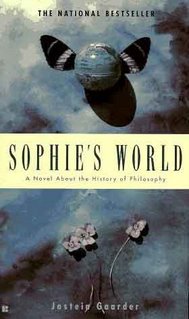 Sophie's World: A Novel About the History of Philosophy
Sophie's World: A Novel About the History of Philosophy(Amazon link)
Sophie's World is one of those books that I started reading a long while ago, got about a quarter through and then for some reason had to put back on the shelf. Well, I just finished it & it's really good. It plays with the ideas of fiction and meta-fiction and does it very well.
In trying to describe it to you I'll warn you now that I'm going to completely blow the plot, so just ignore this post if you don't want to know:
Sophie is a 14 year old who gets into a bizarre philosophical debate with a mysterious older man, Alberto. Initially it's just cryptic notes & packages asking questions of Sophie:
Who are you?
Where does the world come from?
Why is Lego the most ingenious toy in the world?
As she thinks about these the mysterious stranger leads her through an exploration of the history of Philosophy. But it soon evolves into more as it becomes obvious that there's a deeper story here than just a fascinating, but fairly dry, chronological discussion on the great philosophers and their ideas.
Sophie begins to relate their ideas to her life & starts to puzzle out who the mysterious Hilde is & why postcards from Hilde's father are coming to Sophie.
So far so good, if a little dry and slow to be honest.
Then at the halfway point the sublime moment happens that makes you realise that the book does have a stunning story buried inside it. First there's a deeply disturbing passage where Sophie and her guide talk of the English philosopher Locke and his ideas that the world only exists from your own perceptions, beyond that nothing is real. You create the world inside your own head.
Then everything shifts.
The story is taken over by the mysterious Hilde & suddenly both the reader & Sophie realise that Sophie's World is actually a fictional world, controlled by Hilde's father, written for Hilde's amusement.
The final third is all about Sophie's attempts to escape from her fictional reality, something which, in the end, she manages by an act as simple of walking out of the page and disappearing from the author's sight.
This is one of those books, like Jonathon Livingston Seagull that I intend to keep on the shelf and pass onto Molly when she's old enough to appreciate the genius of them.

This comment has been removed by the author.
ReplyDeleteThis is my alltime fave book. It is absolutely amazing. Great to see that someone else likes it as well.
ReplyDeleteI recommend it to everyone as it opens your mind. It is so well written, and deals with many very difficult ideas but in a way that YAs can understand and enjoy (IMO)
Great review, Richard
Hi,
ReplyDeleteSeeing that youre interested in Sophie's world, I would like to ask you to give your own personal response as to what you think to the following question.
Revisit the "red-tinted glasses" extended metaphor in Chapter 25 ('Kant'). What's the meaning of it? (Hint: Consider what Sophie discovers about rationalists and empiricists along the way.) How do these questions of perspective apply to your own life? Use examples from the novel and your life to illustrate your understanding of the "red-tinted glasses" metaphor/experiment.
Thanks. Please contact me through ajay@kgv.net